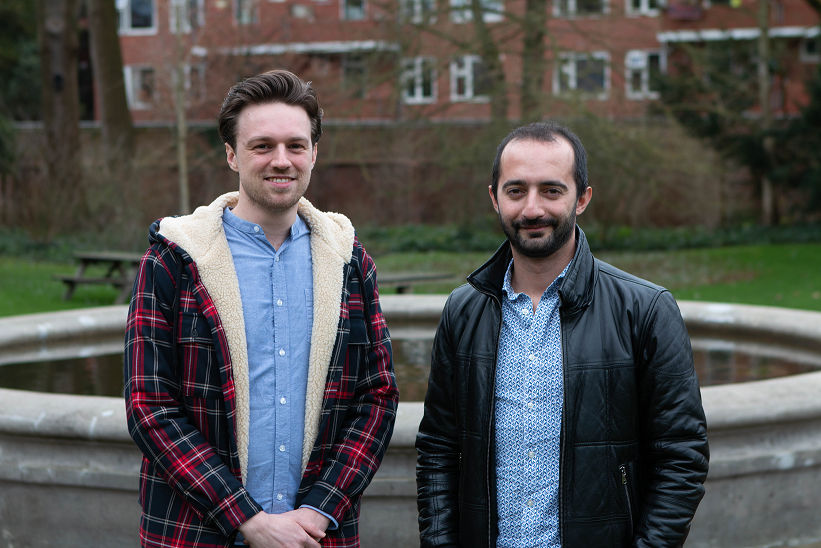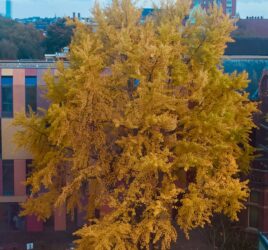
Duo interview: Collaborating with the Foodbank
Every year, Master students in the course Managing Groups collaborate with a societal partner to work on a societal issue that is related to (inter)group dynamics. So far, they worked with the Municipality of Groningen towards improving integration of international students, and strengthening the relations between students and other citizens of Groningen (locally called “Stadjers”). With the Province of Groningen, they worked towards improving voting turn-out among youth in the rural areas.
One of the projects that has inspired most enthusiasm and resulted in an ongoing collaboration is the project with the Food Bank. In my role as coordinator of the course, I spoke with the Food Bank Chairman Ulfert Molenhuis, to set up the collaboration. It soon became clear that he aspires only one goal: to end poverty. His enthusiasm, and that of others at the Food Bank, inspired Yasin Koc (Assistant Professor in Social Psychology) and Gido Metz (Master graduate in Social and Applied Psychology RUG) to a collaboration that continued with Mirjam Nagelmaker – the project leader of Stadjers Hand in Hand (SHH) – well after the course had ended. Time to ask them about their experiences.
Gido, why did you volunteer to work on the Food Bank project after the course had ended?
Gido: “I had been living and studying in Groningen for quite a while, but I had never really left the ‘student bubble’; all my friends were students and I didn’t know any ‘real’ Stadjers. Besides, I had never really put into practice the knowledge I gained during my studies. All changed when I got involved in Stadjers Hand in Hand, first through the Managing Groups course. My fellow students and I wrote a report on how to recruit more volunteers. After the course, Yasin, my fellow student Hilde, and I became volunteers for SHH ourselves.
“I had been living and studying in Groningen for quite a while, but I had never really left the ‘student bubble’”
Yasin, how did you get involved in the project?
Yasin: On my first week at the University of Groningen, I started teaching in the course Managing Groups. The course required students to tackle a societal issue and write a policy advice as well as understand their own group dynamics. They went out to the field to study a project of the Food Bank – Stadjers Hand in Hand. After they presented their policy advice, I said to myself, “You need to be part of this great initiative”.
Could you tell me something more about the project?
Yasin: Stadjers Hand in Hand is a community-building project aiming to tackle poverty in the city of Groningen. It brings together coaches, who are stable income families, and clients, who experience poverty and have difficulty making ends meet. It was initiated by a citizen of Groningen, Mirjam Nagelmaker. When the course helped the project in 2018, the project was at an embryonic stage. Our students provided advice on advertising, writing clear messages, and finding the right ways to attract more coaches and clients to the project.
“Our students provided advice on advertising, writing clear messages, and finding the right ways to attract more coaches and clients to the project.”
The project was small, but Mirjam had big ambitions. During the day of the presentation, I could see Mirjam’s understanding of her project was changing. From our students, she learnt what was missing and what needed to be done to make it both larger and more sustainable. At that point, Gido and I thought we had so much to offer from our insights from social psychology. We had interests in intergroup helping, activist support, and social change. That’s when Gido and I decided to offer our help as volunteers, and we came together to work as a team.
How could your social psychological insights help the project?
Yasin: The first steps were to create an identity for the project, and to gain visibility both offline and online. For this, we developed a logo that would make the project memorable. The logo featured a family holding hands . Next, we created a website which contained information on the project, it’s aims, and how to get involved as a coach or a client. Finally, we developed flyers to spread around the city to reach people. We had long sessions of brainstorming for this, and we used social psychological theories on identity motives to develop the flyer:
“Do you want to help your fellow Stadjer on the road to independence? Then Team Stadjers Hand in Hand is looking for you! In this project, Stadjers who are less fortunate are coached by other Stadjers, with the aim of having them pick up their lives and become part of society again. And our approach works! That is why we can use many more coaches! Do you want to contribute to a city without poverty?”
We chose our words carefully, to highlight a sense of connection, to create an identity showing our commonalities, and to emphasize the efficacy to achieve this goal and for them to regain control of their own lives. While this required a lot of work, our words were based on the true stories of the changing lives of the clients in the project.
Gido: One of our ideas was that people like to be part of a successful project. Therefore, we started by making a Facebook page, on which we started to share weekly updates. In these updates, we focus on stories from clients who got their lives back on track again, thanks to the project. We emphasize how every resident of Groningen, either student or Stadjer, can have a huge and lasting impact on a fellow resident’s life. Shortly after we got involved in the project, a local entrepreneur offered to build a website for us to generate even more publicity (please have a look here).
“We emphasize how every resident of Groningen, either student or Stadjer, can have a huge and lasting impact on a fellow resident’s life.”
What did you personally learn from this project?
Yasin: Being a part of this project also gave me a new goal in my life in Groningen. I believe my job is not only to work at the university, but also try to give back to the community I live in. Especially as an immigrant, SHH helped me develop a new social circle and friendships.
“Especially as an immigrant, SHH helped me develop a new social circle and friendships.’
Gido: Stadjers Hand in Hand has been a great opportunity for me to get in touch with real Stadjers, to put into practice my studies, and to give back to the community.
Yasin: SHH has an important goal: to end the poverty in Groningen. Most clients who receive help from SHH end up leaving the project once they have found stable jobs and have paid their debts. Now we want to understand the antecedents and the vicious cycle of poverty, so that we can break it. As Stadjers, we can transform our society as long as we are hand in hand.
NOTE. Photo by Marrit Wouda



